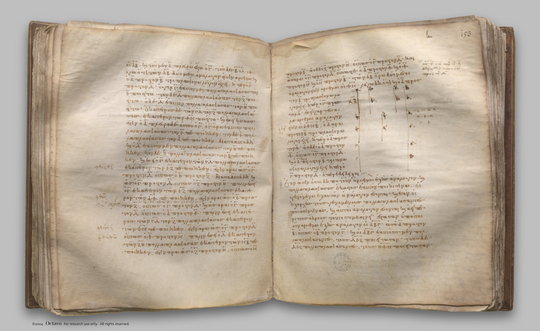index prev next | digilib folio 157

If there be as many numbers as we please in continued proportion, and each by multiplying itself make some number, the products will be proportional; and, if the original numbers by multiplying the products make certain numbers, the latter will also be proportional.
| Ἐὰν ὦσιν ὁσοιδηποτοῦν ἀριθμοὶ ἑξῆς ἀνάλογον, καὶ πολλαπλασιάσας ἕκαστος ἑαυτὸν ποιῇ τινα, οἱ γενόμενοι ἐξ αὐτῶν ἀνάλογον ἔσονται: καὶ ἐὰν οἱ ἐξ ἀρχῆς τοὺς γενομένους πολλαπλασιάσαντες ποιῶσί τινας, καὶ αὐτοὶ ἀνάλογον ἔσονται [ καὶ ἀεὶ περὶ τοὺς ἄκρους τοῦτο συμβαίνει ]. Ἔστωσαν ὁποσοιοῦν ἀριθμοὶ ἑξῆς ἀνάλογον, οἱ Α, Β, Γ, ὡς ὁ Α πρὸς τὸν Β, οὕτως ὁ Β πρὸς τὸν Γ, καὶ οἱ Α, Β, Γ ἑαυτοὺς μὲν πολλαπλασιάσαντες τοὺς Δ, Ε, Ζ ποιείτωσαν, τοὺς δὲ Δ, Ε, Ζ πολλαπλασιάσαντες τοὺς Η, Θ, Κ ποιείτωσαν: λέγω, ὅτι οἵ τε Δ, Ε, Ζ καὶ οἱ Η, Θ, Κ ἑξῆς ἀνάλογόν εἰσιν. Ὁ μὲν γὰρ Α τὸν Β πολλαπλασιάσας τὸν Λ ποιείτω, ἑκάτερος δὲ τῶν Α, Β τὸν Λ πολλαπλασιάσας ἑκάτερον τῶν Μ, Ν ποιείτω. καὶ πάλιν ὁ μὲν Β τὸν Γ πολλαπλασιάσας τὸν Ξ ποιείτω, ἑκάτερος δὲ τῶν Β, Γ τὸν Ξ πολλαπλασιάσας ἑκάτερον τῶν Ο, Π ποιείτω. Ὁμοίως δὴ τοῖς ἐπάνω δείξομεν, ὅτι οἱ Δ, Λ, Ε καὶ οἱ Η, Μ, Ν, Θ ἑξῆς εἰσιν ἀνάλογον ἐν τῷ τοῦ Α πρὸς τὸν Β λόγῳ, καὶ ἔτι οἱ Ε, Ξ, Ζ καὶ οἱ Θ, Ο, Π, Κ ἑξῆς εἰσιν ἀνάλογον ἐν τῷ τοῦ Β πρὸς τὸν Γ λόγῳ. καί ἐστιν ὡς ὁ Α πρὸς τὸν Β, οὕτως ὁ Β πρὸς τὸν Γ: καὶ οἱ Δ, Λ, Ε ἄρα τοῖς Ε, Ξ, Ζ ἐν τῷ αὐτῷ λόγῳ εἰσὶ καὶ ἔτι οἱ Η, Μ, Ν, Θ τοῖς Θ, Ο, Π, Κ. καί ἐστιν ἴσον τὸ μὲν τῶν Δ, Λ, Ε πλῆθος τῷ τῶν Ε, Ξ, Ζ πλήθει, τὸ δὲ τῶν Η, Μ, Ν, Θ τῷ τῶν Θ, Ο, Π, Κ: δι' ἴσου ἄρα ἐστὶν ὡς μὲν ὁ Δ πρὸς τὸν Ε, οὕτως ὁ Ε πρὸς τὸν Ζ, ὡς δὲ ὁ Η πρὸς τὸν Θ, οὕτως ὁ Θ πρὸς τὸν Κ: ὅπερ ἔδει δεῖξαι. | If there be as many numbers as we please in continued proportion, and each by multiplying itself make some number, the products will be proportional; and, if the original numbers by multiplying the products make certain numbers, the latter will also be proportional. Let there be as many numbers as we please, A, B, C, in continued proportion, so that, as A is to B, so is B to C; let A, B, C by multiplying themselves make D, E, F, and by multiplying D, E, F let them make G, H, K; I say that D, E, F and G, H, K are in continued proportion. For let A by multiplying B make L, and let the numbers A, B by multiplying L make M. N respectively. And again let B by multiplying C make O, and let the numbers B, C by multiplying O make P, Q respectively. Then, in manner similar to the foregoing, we can prove that D, L, E and G, M, N, H are continuously proportional in the ratio of A to B, and further E, O, F and H, P, Q, K are continuously proportional in the ratio of B to C. Now, as A is to B, so is B to C; therefore D, L, E are also in the same ratio with E, O, F, and further G, M, N, H in the same ratio with H, P, Q, K. |